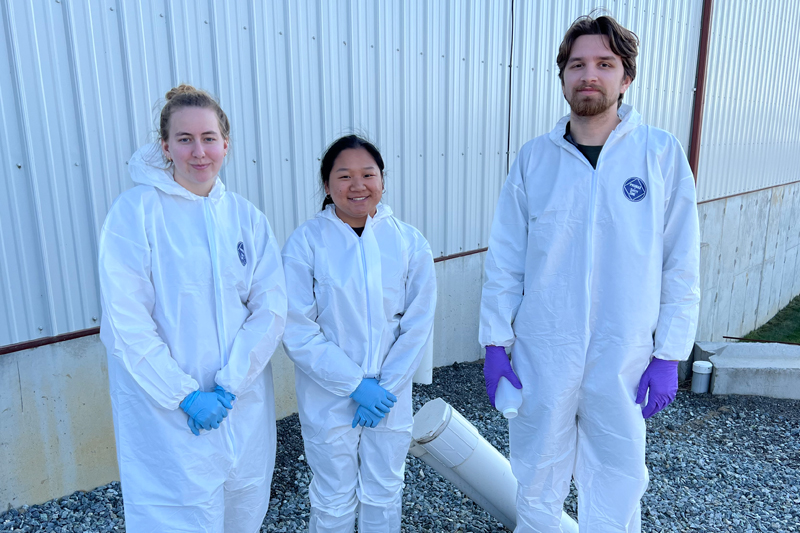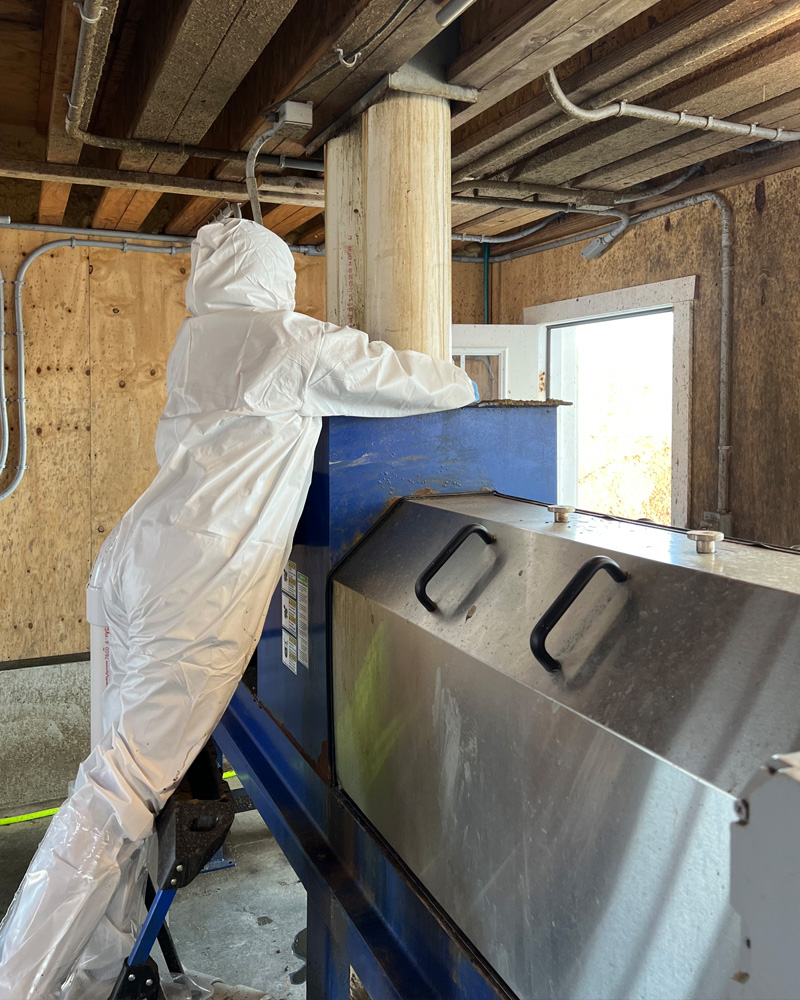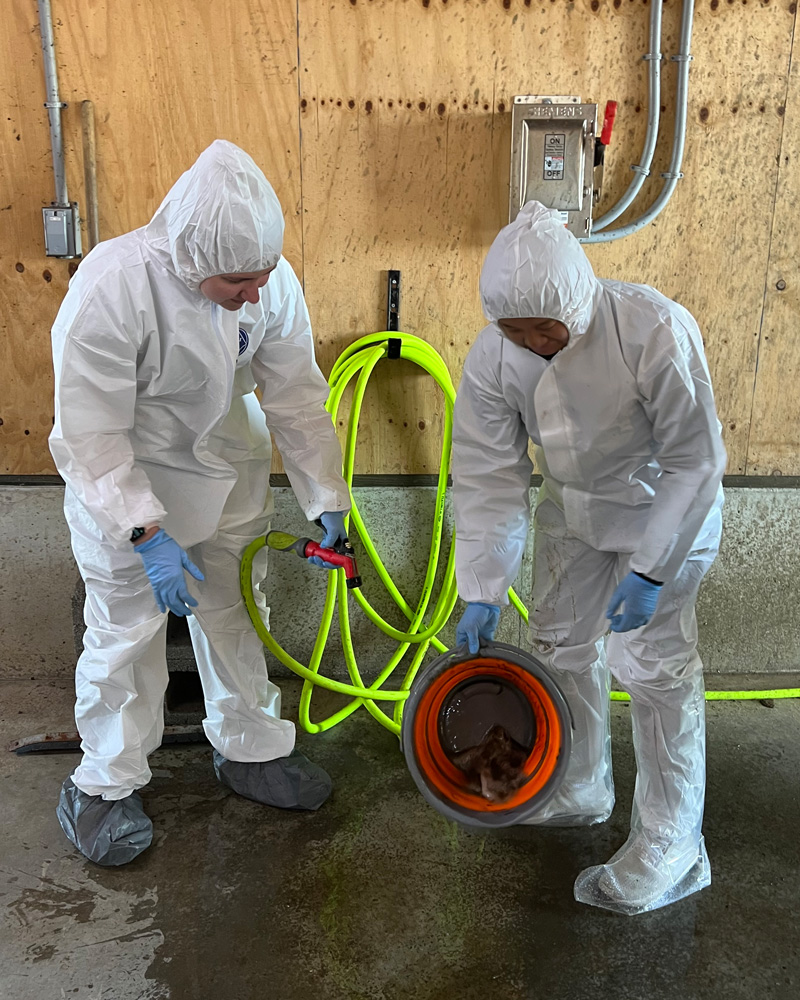


Farm waste illuminates Maryland community
Photos courtesy of Olivia Frego October 06, 2023
UD student Olivia Frego evaluates environmental benefits of electricity-generating system in place at area farm
Residential homes worldwide are powered by electricity. In Rising Sun, Maryland, a group of 20 homes are powered by electricity, but not in the way you’re thinking. The power to these homes is specifically derived from the waste products of a local farm.
University of Delaware junior Olivia Frego is among the researchers studying manure-separating technology — a component of the equipment that powers Kilby Dairy Farm and nearly 20 surrounding homes.
At the dairy, manure and wastewater are effectively sorted into liquids and solids using vibratory screens made by SWECO, an industry leader in particle separation equipment.
The liquids are combined with food waste and pumped into a methane digester that eliminates oxygen and promotes the digestion of manure and waste among microorganisms. These microorganisms produce methane and, through the technology, transform organic waste into power.

The researchers are working with sustainability-focused Newtrient, LLC, a company focused on reducing the environmental footprint of the dairy industry and ensuring its economic viability.
“The purpose of this grant is to evaluate 15 dairy manure management related technologies and practices,” said Jeff Porter, a technical consultant at Newtrient. “One of the technologies to be evaluated was a vibratory screen manufactured by SWECO.”
When contacted by Newtrient about recruiting students to conduct unbiased sampling and testing, Tanya Gressley of the UD Department of Animal and Food Sciences and Amy Shober of the UD Department of Plant and Soil Sciences were eager to collaborate.
“Olivia went to Kilby's every Monday, Wednesday and Friday for the not-so-glamorous job of collecting manure samples. This included rainy days, cold days, hot days and days before exams and major assignments,” Gressley said. “She was completely committed to making sure we collected the best data possible.”
The team was awarded a Conservation Innovation Grant from the United States Department of Agriculture (USDA) Natural Resources Conservation Service to facilitate this project.
“I was asked to conduct this research, not only to look at the substrate for the digester, but also what’s happening with those solids,” said Frego, a pre-veterinary medicine major in the College of Agriculture and Natural Resources. “The SWECO vibratory screens are really what I was looking at. It is a prototype right now and the company is looking to see if it is sustainable.”

The SWECO vibratory screens isolate the solids. After these solids are composted, preventing the overapplication of nutrients, Kilby Dairy sells condensed, essential nutrients, like nitrogen and phosphorus, as concentrated fertilizer.
“As the dairy waste flows through its treatment process, it undergoes a multi-step approach to maximize nutrient recovery,” Porter said.
The handful of surrounding properties are powered by Kilby Dairy’s newest digester. The system enables local residents to turn on lights and appliances, just as they would in a home illuminated by a traditional source of electricity.
In fall 2022, Frego joined this project when she and her fellow student researchers learned to conduct sampling. By the spring semester, Frego began working on her portion of the research, which she wrapped up this summer in her end-of-project report.
Outside of her undergraduate research, Frego studied abroad in New Zealand in Winter 2023; the course’s focus was sustainable agriculture.
“The course really helped put into perspective what is happening on a greater scale,” said Frego, who is also pursuing a minor in animal nutrition. “It was very interesting and helpful when I was writing this report to look at the nitrogen values and how nitrogen leaching works.”
For the technology to receive wider adoption, the researchers urge that the public must strengthen its understanding of effective waste utilization. After nearly a year of learning the intricacies of the separator system, Frego hopes that her work will set an example for the future.
“I hope that this data helps the company share around the nation, so that farmers build trust in the prototype,” Frego said.
Contact Us
Have a UDaily story idea?
Contact us at ocm@udel.edu
Members of the press
Contact us at 302-831-NEWS or visit the Media Relations website

